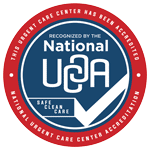 Urgent care centers have become a vital component of the healthcare landscape, providing convenient and accessible medical services for a wide range of non-life-threatening conditions. Despite their growing popularity, there are several myths and misconceptions surrounding urgent care facilities that may prevent individuals from seeking timely medical attention when needed. At M.D. Express Urgent Care, we believe in debunking these myths to ensure that patients receive the care they need promptly. Let’s dispel some of the most common myths about urgent care.
Urgent care centers have become a vital component of the healthcare landscape, providing convenient and accessible medical services for a wide range of non-life-threatening conditions. Despite their growing popularity, there are several myths and misconceptions surrounding urgent care facilities that may prevent individuals from seeking timely medical attention when needed. At M.D. Express Urgent Care, we believe in debunking these myths to ensure that patients receive the care they need promptly. Let’s dispel some of the most common myths about urgent care.
Myth 1: Urgent care centers primarily cater to minor injuries and illnesses.
Fact: While urgent care centers do specialize in treating non-life-threatening conditions such as sprains, cuts and colds, they also offer a broad range of medical services beyond minor injuries and illnesses. Urgent care providers are equipped to handle a variety of acute medical issues, including infections, allergies, asthma attacks and more. Additionally, many urgent care centers offer diagnostic services such as X-rays, laboratory testing and EKGs, allowing for comprehensive evaluation and treatment of a wide range of medical concerns.
Myth 2: You need an appointment to visit an urgent care center.
Fact: One of the primary advantages of urgent care centers is their walk-in nature, which allows patients to receive medical care without the need for an appointment. Whether you’re experiencing sudden symptoms or require prompt medical attention outside of regular office hours, urgent care centers are available to provide timely care without the hassle of scheduling an appointment. Patients can simply walk in and receive prompt attention from qualified healthcare providers.
Myth 3: Urgent care centers are more expensive than primary care providers or emergency rooms.
Fact: Contrary to popular belief, urgent care centers typically offer more affordable healthcare options compared to emergency rooms for non-life-threatening conditions. Additionally, urgent care centers often accept a wide range of insurance plans and offer transparent pricing for uninsured patients. By choosing urgent care for non-emergency medical needs, patients can avoid the high costs associated with emergency room visits and receive timely care at a fraction of the cost.
Myth 4: The quality of care at urgent care centers is inferior to that of primary care providers or emergency rooms.
Fact: Urgent care centers are staffed by board-certified physicians, nurse practitioners, and physician assistants who are trained to provide high-quality medical care for a variety of acute medical conditions. These healthcare professionals have the expertise and experience to diagnose and treat a wide range of medical issues efficiently and effectively. Urgent care centers also adhere to strict standards of patient care and safety, ensuring that patients receive the same level of quality care as they would in a primary care setting or emergency room.
Myth 5: Urgent care centers typically operate solely during standard business hours.
Fact: Many urgent care centers offer extended hours, including evenings, weekends and holidays, to accommodate patients’ busy schedules and provide access to medical care when traditional healthcare providers may be closed. This flexibility allows patients to seek medical attention outside of regular office hours, reducing the need for unnecessary emergency room visits and ensuring that patients receive timely care when they need it most.
Myth 6: Urgent care centers are overcrowded and have long wait times.
Fact: While wait times may vary depending on the time of day and patient volume, many urgent care centers strive to provide prompt and efficient care to minimize wait times for patients. Additionally, urgent care centers often offer online check-in options, allowing patients to reserve their spot in line and wait from the comfort of their own home. By utilizing these convenient features, patients can reduce their wait times and receive timely care without the inconvenience of long wait times.
Myth 7: Urgent care centers are not equipped to handle serious medical emergencies.
Fact: While urgent care centers are not equipped to handle life-threatening emergencies such as heart attacks, strokes, or severe injuries, they are equipped to provide prompt medical attention for a wide range of non-life-threatening conditions. Urgent care centers are staffed by qualified healthcare providers who can evaluate and treat acute medical issues, provide diagnostic testing and offer referrals to higher levels of care when necessary. For serious emergencies, patients should always call 911 or visit the nearest emergency room for immediate medical attention.
Contact Us Today
At M.D. Express Urgent Care, we are committed to debunking myths and misconceptions surrounding urgent care to ensure that patients receive the timely and high-quality medical care they deserve. If you have questions or concerns about urgent care services or would like to learn more about how we can help you and your family, we encourage you to contact one of our convenient locations for prompt medical attention.

